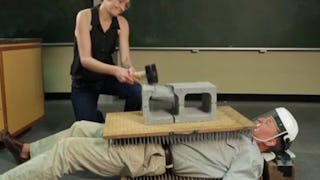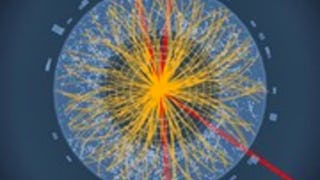Build a comprehensive foundation in fundamental physics principles that govern the natural world. This course provides essential expertise in classical mechanics, thermodynamics, and optics, offering practical frameworks to analyze and explain diverse physical phenomena through quantitative approaches. Learn to apply Newton's laws to complex scenarios, understand energy and momentum principles, and explore wave mechanics through simple harmonic motion. Master the first and second laws of thermodynamics with real-world applications, from microscopic atomic systems to massive engines. Discover optical phenomena including interference, diffraction, and polarization of electromagnetic waves. Whether you're pursuing engineering, physical sciences, or technical careers requiring analytical problem-solving, this course equips you with the fundamental physics knowledge used by scientists and engineers to understand, predict, and optimize physical systems across all scales of nature.

Saving 40% on access to 10,000+ programs is a holiday treat. Save now.


Recommended experience
What you'll learn
Master Newton's laws and apply force, energy, and momentum principles to analyze mechanical systems and predict motion in diverse scenarios.
Understand thermodynamic principles and laws governing energy transfer, entropy, and system behavior from microscopic to macroscopic scales.
Explore simple harmonic motion and wave mechanics, analyze wave propagation, properties, and behaviors across different physical systems.
Apply optical concepts including wave-particle duality, interference, diffraction, and polarization to understand electromagnetic phenomena.
Skills you'll gain
- Engineering
- Mathematical Theory & Analysis
- Mechanics
- Thermal Management
- Experimentation
- Problem Solving
- Science and Research
- Vibrations
- Critical Thinking
- Mathematical Modeling
- Analytical Skills
- Software Development
- Physical Science
- Computer Science
- Physics
- Research
- Critical Thinking and Problem Solving
- Logical Reasoning
- Applied Mathematics
- Calculus
Details to know

Add to your LinkedIn profile
November 2025
See how employees at top companies are mastering in-demand skills

There are 10 modules in this course
In this module, you will learn the concept of force in physics and why forces are vectors. From Newton’s laws of motion, you will understand the concept of an inertial frame of reference and the relation between the acceleration of a system and the net force applied to it.
What's included
16 videos5 readings14 assignments
In this module, you will learn the principle of work done by a force and how it affects the energy contained in a body. You will also learn the implications of the conservation of momentum in real and simple real-life scenarios.
What's included
15 videos3 readings16 assignments
Physical systems describing periodic motion are possibly the simplest and most precise way to start exploring more complex phenomena in nature. In this module, you will learn the basic dynamics of a single degree of freedom performing a periodic motion. You will also learn how a simple damping effect can make the system more realistic.
What's included
11 videos2 readings12 assignments
Thermodynamics is about how everyday systems such as engines and refrigerators to microscopic systems of atoms work through energy transfer. In this module, you will gain a thorough understanding of how to quantify the transfer of heat and work into or out of such systems. This module will further help you develop a fundamental understanding of the basics of thermodynamics.
What's included
11 videos3 readings12 assignments
The second law of thermodynamics is a universal law that could be observed in the tiniest particles to massive black holes. In this module, you will state and understand the second law of thermodynamics. The module will also discuss the concept of entropy change and its relevance to the second law of thermodynamics.
What's included
12 videos2 readings9 assignments
In this module, the fundamentals of wave propagation will be discussed. The module will highlight different kinds of waves, their properties, and the effect of the medium on wave propagation. The exchange of energy when two waves superimpose with each other and the nature of the resulting waveform will be dealt qualitatively and quantitatively. You will also learn how to reconstruct any waveform by superposition of normal modes (Fourier theorem).
What's included
12 videos9 readings13 assignments
This module deals with a detailed overview of light as an electromagnetic wave. The module will briefly discuss the interesting conundrum of wave–particle duality and the experiments that illustrate this phenomenon. The module will also give you a brief overview of how the transverse nature of the wave leads to interesting physical phenomena and the manner in which the energy of the electromagnetic wave gets redistributed as it propagates in different media.
What's included
8 videos6 readings9 assignments
In this module, you will be introduced to the superposition of waves. The module will also describe how the interference pattern caused by the superposition of coherent waves gives rise to different optical patterns. The conditions for bright and dark fringes due to the interference effect will be discussed in detail. Experiments such as Newton’s ring will be used to illustrate the significance of path difference and phase difference in giving rise to interference patterns.
What's included
12 videos9 readings13 assignments
In this module, you will be introduced to the bending of light around the edges of an obstacle. The module will discuss the superposition of waves undergoing diffraction in detail. The module will further show experiments that produce diffraction patterns and highlight the expression for bright and dark fringes. It also illustrates how the diffraction effects are extensively used to study the structure of materials, which helps in predicting the properties.
What's included
11 videos12 readings12 assignments
In this module, you will study the transverse nature of light using the concept of electric field polarization. The module will dive deep into the changes that an electric field component of electromagnetic waves undergoes after reflection and refraction. The module will further discuss the investigation of polarization effects using polarizers and analyzers.
What's included
11 videos10 readings12 assignments
Instructor

Explore more from Physics and Astronomy
 Status: Preview
Status: PreviewUNSW Sydney (The University of New South Wales)
 Status: Preview
Status: PreviewThe Hong Kong University of Science and Technology
 Status: Free Trial
Status: Free TrialRice University
 Status: Preview
Status: PreviewUniversity of Geneva
Why people choose Coursera for their career





Open new doors with Coursera Plus
Unlimited access to 10,000+ world-class courses, hands-on projects, and job-ready certificate programs - all included in your subscription
Advance your career with an online degree
Earn a degree from world-class universities - 100% online
Join over 3,400 global companies that choose Coursera for Business
Upskill your employees to excel in the digital economy
Frequently asked questions
To access the course materials, assignments and to earn a Certificate, you will need to purchase the Certificate experience when you enroll in a course. You can try a Free Trial instead, or apply for Financial Aid. The course may offer 'Full Course, No Certificate' instead. This option lets you see all course materials, submit required assessments, and get a final grade. This also means that you will not be able to purchase a Certificate experience.
When you enroll in the course, you get access to all of the courses in the Specialization, and you earn a certificate when you complete the work. Your electronic Certificate will be added to your Accomplishments page - from there, you can print your Certificate or add it to your LinkedIn profile.
Yes. In select learning programs, you can apply for financial aid or a scholarship if you can’t afford the enrollment fee. If fin aid or scholarship is available for your learning program selection, you’ll find a link to apply on the description page.
More questions
Financial aid available,
¹ Some assignments in this course are AI-graded. For these assignments, your data will be used in accordance with Coursera's Privacy Notice.


